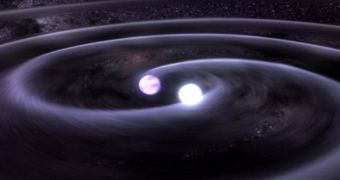According to a new scientific study, it would appear that there is indeed a class of planets that can survive the excessively harsh conditions it is subjected to while spinning around binary systems.
Researchers say that retrograde planets, which are basically planets orbiting backwards in regards to how their parent stars spin, have a chance of surviving such destructive systems.
The first two retrograde exoplanets were discovered last year, with their respective discoveries announced just one day after the other.
Since then, astronomers have taken a deep interest in the properties that these extrasolar planets have. They are especially interested in learning how these celestial bodies came to have the type of orbits they now do.
One of the possible explanations that have been set forth since is that they were knocked off their original course by impacts or brush offs with comets and large asteroids.
When star systems forms, the debris that get left behind after a star develops begin to form into planets, asteroids, comets, meteorites and all sorts of other bodies.
But all of these structures differentiate from a formation called a protoplanetary disk, which orbits in the same orbital plane around the star, and which spins in the same direction as the star does.
Therefore, it is theoretically impossible for an exoplanet developed inside a protoplanetary disk to spin backwards in respect to its star. Yet a handful of cases have been discovered in which this happens.
Now astronomers say that this may be what allows some bodies orbiting binary stars systems to endure.
Generally, the amount of gravitational tug that two stars orbiting each other exert on anything around them is extremely disruptive, and very little exoplanets can remain stable under the pressure
The new idea belongs to University of Texas-Arlington researchers Manfred Cuntz and Jason Eberle, who recently conducted a series of investigations on the binary star system Nu Octanis.
According to the team, it could be that employing a retrograde orbit allows the exoplanet to escape gravitational destruction. However, they admit that space bodies on this type of orbits are very rare.
In our solar system, only the moon Triton revolves around its parent planet, the gas giant Neptune, in a retrograde orbit, Wired reports.
Astronomers believe that this happens because the body was, at its origins, a Kuiper Belt asteroids. It was trapped in its current orbit due to an accident.

 14 DAY TRIAL //
14 DAY TRIAL //